天津一中2013-2014-1高三年级二月考英语试卷
- 格式:doc
- 大小:198.50 KB
- 文档页数:12
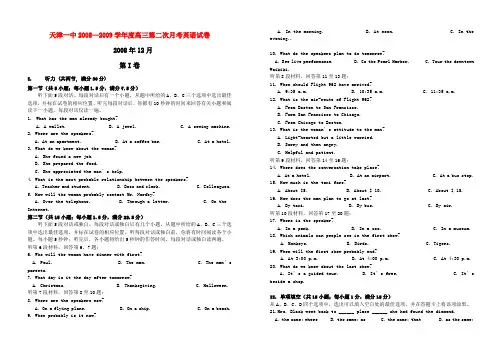
天津一中2008—2009学年度高三第二次月考英语试卷2008年12月第I卷I.听力 (共两节, 满分30分)第一节(共5小题;每小题1.5分,满分7.5分)听下面5段对话。
每段对话后有一个小题,从题中所给的A、B、C三个选项中选出最佳选项,并标在试卷的相应位置。
听完每段对话后,你都有10秒钟的时间来回答有关小题和阅读下一小题。
每段对话仅读一遍。
1.What has the man already bought?A. A wallet.B. A jewel.C. A sewing machine.2. Where are the speakers?A. At an apartment.B. At a coffee bar.C. At a hotel.3. What do we know about the woman?A. She found a new job.B. She prepared the food.C. She appreciated the man’s help.4. What is the most probable relationship between the speakers?A. Teacher and student.B. Boss and clerk.C. Colleagues.5. How will the woman probably contact Mr. Nordby?A. Over the telephone.B. Through a letter.C. On the Internet.第二节(共15小题;每小题1.5分,满分22.5分)听下面5段对话或独白。
每段对话或独白后有几个小题,从题中所给的A、B、C三个选项中选出最佳选项,并标在试卷的相应位置。
听每段对话或独白前,你将有时间阅读各个小题。
每小题5秒钟;听完后,各小题将给出5秒钟的作答时间。
每段对话或独白读两遍。
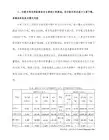
天津一中2018--2019--1高三年级一月考英语试卷本试卷分为第I卷(选择题)、和第II卷(非选择题)两部分,共150分,考试用时120分钟。
考生务必将答案涂写在答题卡和答题纸上,答在试卷上的无效。
祝各位考生考试顺利!第I卷(选择题,共115分)第一部分:听力测试(共两节,满分20分)第一节(共5小题;每小题1分,共5分)听下面5段对话。
每段对话后有一道小题,从每题所给的A、B、C三个选项中选出最佳选项。
听完每段对话后,你将有10秒钟的时间来回答有关小题和阅读下一小题。
每段对话你将听一遍。
例:What is the man going to read?A. A newspaper.B. A magazine.C. A book.答案是A。
1. When will the film start?A. At 5:00.B. At 6:00.C. At 7:00.2. Which club will the man join?A. The film club.B. The travel club.C. The sports club.3. What was the weather like in the mountains yesterday?A. Sunny.B. Windy.C. Snowy.4. What does the man want to cut out of paper?A. A fish.B. A bird.C. A monkey.5. Where does the conversation most probably take place?A. In a library.B. At a bookstore.C. In a museum.第二节(共10小题;每小题1.5分,共15分)听下面4段对话或独白。
每段对话或独白后有几道小题,从每题所给的A、B、C三个选项中选出最佳选项。
听每段对话或独白前,你将有5秒钟的时间阅读每小题。
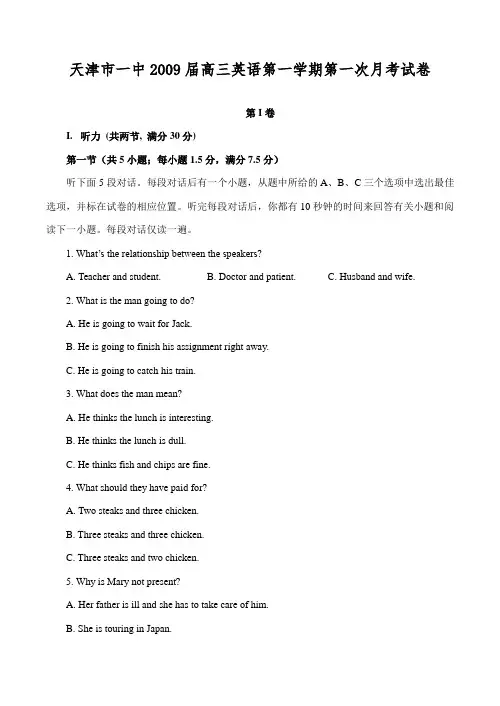
天津市一中2009届高三英语第一学期第一次月考试卷第I卷I.听力(共两节, 满分30分)第一节(共5小题;每小题1.5分,满分7.5分)听下面5段对话。
每段对话后有一个小题,从题中所给的A、B、C三个选项中选出最佳选项,并标在试卷的相应位置。
听完每段对话后,你都有10秒钟的时间来回答有关小题和阅读下一小题。
每段对话仅读一遍。
1. What’s the relationship between the speakers?A. Teacher and student.B. Doctor and patient.C. Husband and wife.2. What is the man going to do?A. He is going to wait for Jack.B. He is going to finish his assignment right away.C. He is going to catch his train.3. What does the man mean?A. He thinks the lunch is interesting.B. He thinks the lunch is dull.C. He thinks fish and chips are fine.4. What should they have paid for?A. Two steaks and three chicken.B. Three steaks and three chicken.C. Three steaks and two chicken.5. Why is Mary not present?A. Her father is ill and she has to take care of him.B. She is touring in Japan.C. She is in Japan to see her father.第二节(共15小题;每小题1.5分,满分22.5分)听下面几段对话或独白。
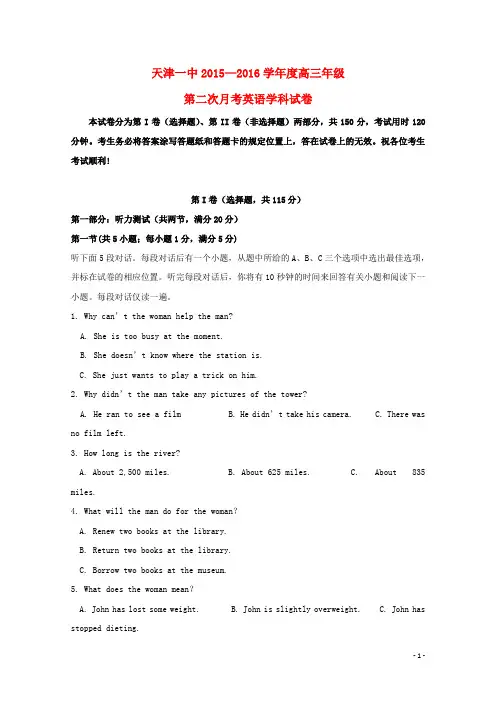
天津一中2015—2016学年度高三年级第二次月考英语学科试卷本试卷分为第I卷(选择题)、第II卷(非选择题)两部分,共150分,考试用时120分钟。
考生务必将答案涂写答题纸和答题卡的规定位置上,答在试卷上的无效。
祝各位考生考试顺利!第I卷(选择题,共115分)第一部分:听力测试(共两节,满分20分)第一节(共5小题;每小题1分,满分5分)听下面5段对话。
每段对话后有一个小题,从题中所给的A、B、C三个选项中选出最佳选项,并标在试卷的相应位置。
听完每段对话后,你将有10秒钟的时间来回答有关小题和阅读下一小题。
每段对话仅读一遍。
1. Why can’t the woman help the man?A. She is too busy at the moment.B. She doesn’t know where the station is.C. She just wants to play a trick on him.2. Why didn’t the man take any pictures of the tower?A. He ran to see a filmB. He didn’t take his camera.C. There was no film left.3. How long is the river?A. About 2,500 miles.B. About 625 miles.C. About 835 miles.4. What will the man do for the woman?A. Renew two books at the library.B. Return two books at the library.C. Borrow two books at the museum.5. What does the woman mean?A. John has lost some weight.B. John is slightly overweight.C. John has stopped dieting.第二节(共10个小题,每小题1.5分,满分15分)听下面几段材料。
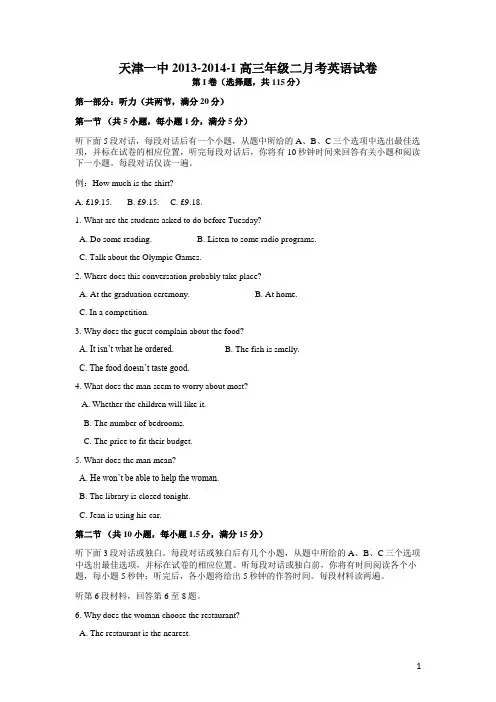
天津一中2013-2014-1高三年级二月考英语试卷第I卷(选择题,共115分)第一部分:听力(共两节,满分20分)第一节(共5小题,每小题1分,满分5分)听下面5段对话,每段对话后有一个小题,从题中所给的A、B、C三个选项中选出最佳选项,并标在试卷的相应位置,听完每段对话后,你将有10秒钟时间来回答有关小题和阅读下一小题。
每段对话仅读一遍。
例:How much is the shirt?A. £19.15.B. £9.15.C. £9.18.1. What are the students asked to do before Tuesday?A. Do some reading.B. Listen to some radio programs.C. Talk about the Olympic Games.2. Where does this conversation probably take place?A. At the graduation ceremony.B. At home.C. In a competition.3. Why does the guest complain about the food?A. It isn‟t what he ordered.B. The fish is smelly.C. The food doesn‟t taste good.4. What does the man seem to worry about most?A. Whether the children will like it.B. The number of bedrooms.C. The price to fit their budget.5. What does the man mean?A. He won‟t be able to help the woman.B. The library is closed tonight.C. Jean is using his car.第二节(共10小题,每小题1.5分,满分15分)听下面3段对话或独白。
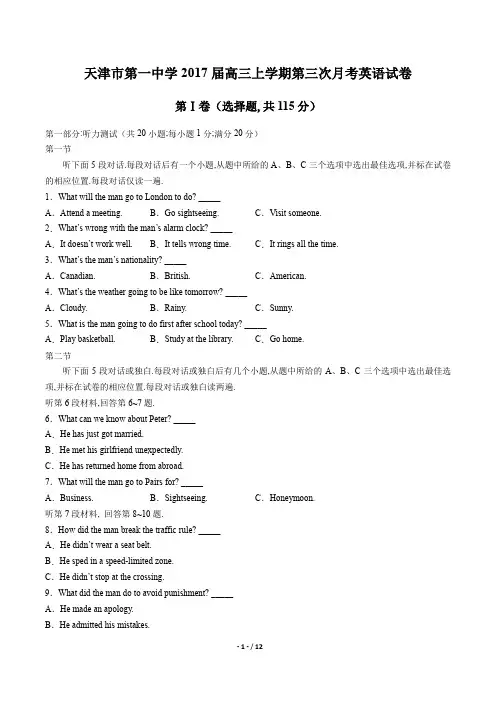
天津市第一中学2017届高三上学期第三次月考英语试卷第Ⅰ卷(选择题,共115分)第一部分:听力测试(共20小题;每小题1分;满分20分)第一节听下面5段对话.每段对话后有一个小题,从题中所给的A、B、C三个选项中选出最佳选项,并标在试卷的相应位置.每段对话仅读一遍.1.What will the man go to London to do? _____A.Attend a meeting. B.Go sightseeing. C.Visit someone.2.What’s wrong with the man’s alarm clock? _____A.It doesn’t work well.B.It tells wrong time. C.It rings all the time.3.What’s the man’s nationality? _____A.Canadian. B.British. C.American.4.What’s the weather going to be like tomorrow? _____A.Cloudy. B.Rainy. C.Sunny.5.What is the man going to do first after school today? _____A.Play basketball. B.Study at the library. C.Go home.第二节听下面5段对话或独白.每段对话或独白后有几个小题,从题中所给的A、B、C三个选项中选出最佳选项,并标在试卷的相应位置.每段对话或独白读两遍.听第6段材料,回答第6~7题.6.What can we know about Peter? _____A.He has just got married.B.He met his girlfriend unexpectedly.C.He has returned home from abroad.7.What will the man go to Pairs for? _____A.Business. B.Sightseeing. C.Honeymoon.听第7段材料, 回答第8~10题.8.How did the man break the traffic rule? _____A.He didn’t wear a seat belt.B.He sped in a speed-limited zone.C.He didn’t stop at the crossing.9.What did the man do to avoid punishment? _____A.He made an apology.B.He admitted his mistakes.C.He tried to establish a relationship.10.How was the man dealt with in the end? _____A.He received no punishment.B.He was fined by the woman.C.He couldn’t drive any more.听第8段材料,回答第11~13题.11.What day is it today? _____A.Monday. B.Thursday. C.Saturday. 12.What does the woman plan to do on Saturday evening? _____A.Clean the house.B.Help Julie with her science project.C.Read her history assignment.13.What’s the possible relationship betwee n the two speakers? _____ A.Husband and wife. B.Friends. C.Doctor and patient. 听第9段材料,回答第14~16题.14.How much did the man pay to mail his parcel? _____A.140yuan. B.410yuan. C.41yuan. 15.Which country did the man want to mail his parcel to? _____ A.America. B.Australia. C.Austria. 16.Why should the man fill in his true name? _____A.His parcel can be returned when something is wrong.B.His friend will know who mailed the parcel.C.It can save some money.听第10段材料,回答第17~20题.17.Where was the woman traveling? _____A.In Asia. B.In Africa. C.In Europe. 18.What was the weather like that night? _____A.Very hot. B.Very cool. C.Rainy.19.Why were they worried about leaving the windows open? _____A.They were afraid they would catch a cold.B.They were worried their things would be stolen.C.It was not a custom of that area.20.Who crashed into the pots and pans? _____A.Her husband. B.A thief. C.Herself.第二部分:英语知识运用(共两节,满分45分)第一节单项填空(共15小题;每小题1分,满分15分)从A、B、C、D四个选项中,选出可以填入空白处的最佳选项.21.—You mean you missed the concert last night?—__________. I arrived at the hall half an hour before it finished.A.Not exactly B.Not at all C.Not especially D.Not really22.I still find it hard to imagine that such a clever child _________ make such a foolish mistake.A.shall B.must C.can D.should23.His attention __________ on his work, Jack didn’t notice that it was getting dark.A.focusing B.focused C.being focused D.was focused 24.All the guests at the party were dancing and singing happily __________ suddenly the lights went off. A.until B.while C.when D.before25.This is the website __________ I intend to add to my favorite to help me learn how to write poems. A.which B.where C.what D.why26.In our co mpany, I’m in a rather __________ position, as my job is different from anyone else’s.A.unique B.abnormal C.tiresome D.random27.He wrote many children’s books, nearly half of __________ published in the 1990s.A.whom B.them C.which D.that 28.However frequently he _________ in doing the experiment, he never loses his confidence.A.defeat B.was defeated C.will defeat D.gets defeated 29.The reason why he _________ his post was that there was a more attractive and challenging job for him. A.remained B.removed C.replaced D.resigned30.As students, _________full use we have made of our time to study, there’s still room for improvement. A.whichever B.whatever C.though D.however31.My parents always remind us that by no means __________no respect for our teachers.A.did we show B.we should show C.we show D.should we show 32.While the book was not welcomed by scholars, I believed that it would make an immediate __________ to the general readers.A.impact B.appeal C.request D.contribution 33.They are always short of water to drink, __________less to bathe in.A.much B.too C.rather D.no34.__________ is known to all is that watching TV properly may make our mind broad and our life rich.A.It B.As C.That D.What35.We would join them in the dress-up party __________.A.whether they invite us B.shall we invite us C.should they invite us D.if they invite us第二节完形填空(共20小题;每小题1.5分,满分30分)Enjoy your own life without comparing it with that of another--Marquis de CondorcetIf you took the strengths of others, and compared them to your weaknesses, do you think this would make youfeel good? The funny thing is, this is 36 most of us do at one time or another—and some of us do pretty 37 .It’s surely a practice for a(n) 38 in self‐confidence and for unhappiness. Let’s say I take a look at someone who creates 39 artwork on their website and I look at my art, and realize I don’t come 40 to being matched with him. In fact, I look p retty pitiful. But it’s not a fair41 .If I looked at my strengths—writing useful and honest posts—I can see that I have a lot to offer, a lot to be happy about.That’s so important—being able to look at your own strengths, and see your true 42 .It’s actually one of the 43 to success and happiness.I want to talk about this issue 44 an email from a reader recently: I have some teammates from very rich families, I can’t stop myself comparing my lifestyle with 45 .I must say that my 46 planning is sound enough to take care of my existing family; and I can take care of new family members also, at least for 47even if I lose my current job. But 48 I see or hear them spending so much money after possessions, I start comparing 49 .How can I stop this habit, without changing jobs?This is an excellent but tough 50 . I think it’s 51 to compare ourselves to others, but it often makes us unhappy even if we have enough and 52 be happy with what we have. My quick advice: try to be aware of when you start comparing yourself to other once you’ve developed this 53 , stop yourself and tell yourself, “Stop that!” And then 54 thinking about all the things you do have, the things you love, the people you have and the blessings that 55 has given you. Make this a regular practice, and you’ll start to be happier you’re your life.36.A.why B.what C.that D.how37.A.often B.seldom C.usually D.always38.A.rise B.increase C.drop D.failure 39.A.astonished B.disappointing C.shocked D.amazing40.A.up B.close C.down D.closely 41.A.comparison B.communication C.competition D.connection 42.A.strengths B.shortcomings C.values D.weaknesses 43.A.reasons B.keys C.causes D.means 44.A.because of B.regardless of C.in spite of D.in case of 45.A.them B.their C.themselves D.theirs 46.A.financial B.annual C.special D.beneficial 47.A.sometime B.some time C.some times D.sometimes 48.A.however B.whatever C.wherever D.whenever49.A.then B.later C.again D.thus50.A.question B.person C.phenomenon D.reader 51.A.strange B.natural C.difficult D.important 52.A.must B.can C.may D.should53.A.awareness B.hobby C.tradition D.custom54.A.stop B.help C.come D.start 55.A.happiness B.life C.success D.confidence第三部分:阅读理解(共20小题:每小题2.5分,满分50分)阅读下列短文,从每题所给的四个选项A、B、C、D四个选项中,选出最佳选项.AAnnouncementsBret Harte vs. Calaveras alumni boysThe annual Bret Harte vs. CHS graduates boys basketball game will be held at 7p. m., Saturday, Nov. 30, at Calaveras High. All players must have played at least one year of varsity(校队)basketball. Cost to play is $30. Admission for audience is $ 5for adults and $ 2for kids. 6-year-old kids and kids who are under 6are admitted free. For more information, call Kraig Clifton at 743-0679or Jeff Ellingham at 736-0162.CHS girls basketball skillsThe Calaveras High School girls basketball program presents the Junior Redskins Winter Skills, a developmental basketball program for girls in fifth through eighth grades that will be held from 2p.m. to 4:30 p.m. , Sundays. Sign-ups are still being accepted for the second of the two five-week sessions, which will be held on five consecutive(连续的)Sundays beginning on Jan. 82 017.Cost is $25per session. Each participant receives a T-shirt at the end of each session. For more information or to sign up, call Jeremy Malamed at 217-4563 or email sports Calent @ gmail. com.CHS swim/baseball coaching vacanciesCalaveras High School(CHS)is looking for a head boys/girls swim coach and a baseball coach for the 2016spring season. Applications will be accepted and jobs will remain open until filled. Interview dates are to be set. Anyone interested can stop by the district office or the high school for an application. For more information, call Mike Koepp at 754-1811.Foothills Little League sign-upsFoothills Little League will hold sign-ups for the 2017season from 6p.m. to 8p.m., Wednesday, Dec. 6, at Pizza Factory in Valley Springs. All players must provide proofs of residency and a birth certificate. For more information, call Shawn Threet at 304-7399 or leave a message at 772-1516.Yoga in Rail Road FlatYoga is being offered at Rail Road Flat Elementary from 9:30 a.m. to 11a.m., Fridays with instructor Kristine Louise. Costs are a $5instructor fee and $2 donation to The Friends of Rail Road Flat School. For more information, visit .56.Who will take part in the game to be held on Nov. 30?A.Boys who are studying in CHS at present. B.All the students graduated from CHS.C.Boys who were on the CHS basketball team. D.Any audience who is from Bret Harte.57.If you want to watch girls play basketball _________.A.you can make a call to Kraig Clifton B.you can realize your goal on Jan. 152 017C.you can buy a T-shirt with the girls’ names D.you can visit sports. Calent @ gmail. com 58.As an excellent baseball coach you will focus on __________.A.CHS girls basketball Skills B.Foothills Little League sign-upsC.Bret Harte vs. Calaveras alumni boys D.CHS swim/baseball coaching vacancies59.If you want to register in Foothills Little League ________.A.you must provide your graduate certificate B.you must show your personal signatureC.you must provide your personal identification D.you must prove to be a local resident60.If two adults take two children to practice yoga they should pay ________.A.28 dollars B.8 dollars C.20 dollars D.14 dollarsBA thief who dropped a winning lottery ticket at the scene of his crime has been given a lesson in honesty. His victim, who picked up the ticket, then claimed the $25, 000 prize, managed to trace him, and handed over the cash. The robbery happened when maths professor Vinicio Sabbatucci, 58, was changing a tire on an Italian motorway. Another motorist, who stopped “to help”, stole a suitcase from his car and drove off. The professor found the dropped ticket and put it in his pocket before driving home to Ascoli in eastern Italy.Next day, he saw the lottery results on TV and, taking out the ticket, realized it was a winner. He claimed the 60 million lire(里拉)prize. Then he began a battle with his conscience. Finally, he decided he could not keep the money despite having been robbed. He advertised in newspapers and on the radio, saying, “I’m trying to find the man who robbed me. I have 60 million lire for him--a lottery win. Please meet me. Anonymity9(匿名)guaranteed.”Professor Sabbatucci received hundreds of calls from people hoping to trick him into handing them the cash. But there was one voice he recognized and he arranged to meet the man in a park. The robber, a 35‐year‐old unemployed father of two, gave back the suitcase and burst into tears. He could not believe what was happening. “Why didn’t you keep the money?” he asked. The professor replied, “I couldn’t because it’s not mine.” Then he walked off, spurning the thief’s offer of a reward.61.The sentence “Then he began a battle with his conscience.” In Paragraph 2implies all of the following except that _________.A.he knew what he should do as soon as he saw the lottery resultsB.he hesitated about keeping the money for some timeC.he thought for a moment of avenging himself on the robberD.he came to realize that honesty is more important than money62.Hundreds of people phoned Professor Sabbaturcci because they _________.A.wanted to make fun of him B.hoped to get the moneyC.knew who the robber was D.lost the lottery ticket63.How did the robber feel when the victim wanted to find him?A.Excited B.Frightened C.Ashamed D.Incredible64.The word “spurning” in the last sentence can be replaced by __________.A.accepting B.claiming C.rejecting D.cancelling65.If the story appears in a newspaper, the best title might be __________.A.A Thief’s Lucky Day B.A Popular Maths ProfessorC.A Magic Lottery D.A Reward of HonestyCStyrofoam, or polystyrene, is a light-weight material, about 95percent air, with very good insulation*(隔热)properties, according to Earthsource. org. It is used in products from cups that keep your drinks hot or cold to packaging material that protects items during shipping.With the above good features, Styrofoam still enjoys a bad reputation. It cannot be recycled without releasing dangerous pollution into the air. The U.S. Environmental Protection Agency says it is the fifth-largest creator of harmful waste.But now the common worms which are usually disgusting can come to the rescue, specifically, mealworms. Scientists from the U. S. and China have discovered that mealworms can digest plastic. One mealworm can digest a pill-sized amount of plastic a day. Study co-author Wei-Min Wu says that in 24hours, the plastic is turned into carbon dioxide.Since Styrofoam has no nutrition at all, are the worms hurt by eating plastic? Much to the scientists’ surprise, the study found that worms eating Styrofoam were as healthy as worms eating bran(谷糠).The researchers will study the worm’s eating habits and digesting system, looking to copy the plastic breakdown but on a larger scale. Once the way can be put into practice, it will make a revolutionary difference to the disposal of plastic.“Solving the issue of plastic pollution is important”, says Wu, a Stanford University environmental engineering instructor. After all, our earth is small and landfill space is becoming limited with too much garbage waiting to be dealt with, he says.About 33-million tons of plastic are thrown away in the United States every year. Plastic plates, cups and containers take up 25percent to 30 percent of space in America’s landfills. One Styrofoam cup takes more than 1million years to recycle in a landfill, according to Cleveland State University.66.What do we know about Styrofoam? _____A.It can be used to cool drinks.B.It is a weightless material.C.It is harmful when recycled.D.It is usually used on ships.67.What can we infer from the third paragraph? _____A.Mealworms have amazing digesting power.B.Mealworms are not bad in their nature.C.Mealworms can rescue people’s lives.D.People misunderstood mealworms in the past.68.Why will researchers study the worm’s eating habits and digesting system? _____A.To find ways to help mealworms grow larger.B.To imitate their ways of breaking down plastic.C.To help develop their digesting ability.D.To make sure of their safety after eating plastic.69.In the future, plastic may be recycled _____.A.by raising amounts of mealwormsB.by environmental engineering instructorsC.using a method inspired by eating mealwormsD.without sending out dangerous pollution70.What’s the main idea of this passage? _____A.Styrofoam is widely used in daily life.B.Mealworms are genius at eating plastic.C.Plastic recycling may be no more a problem.D.Plastic can be turned into carbon dioxide.DI can tell you from experience, both private and public schools have one thing in common. Look around your school. What do you see? Beautiful buildings? Good teachers? I’ll tell you w hat I see: the need to have the most expensive clothing, newest phone, most expensive car, etc. Think about it. Do you find yourself wanting to one-up (胜过)your friends? Be honest. I know I have at some point in time.In my school parking lot, for example, there are more BMW’s and Mercedes than one could possibly imagine. When I look at my 2006 Honda CRV, the butterflies in my stomach start flapping their wings wildly. Do people look at me differently because my car is old?What about my phone? What about text messaging? Earlier this year in my statistics class my teacher asked our class how many texts each student received in the past 24 hours. My count was twelve. Twenty minutes later, people started to come up with the answers of 200 or more. I firmly believe that people were in competition with each other. Who could get the most texts? Having only twelve texts sent to me made me feel terrible. Was it bad that hardly anyone had texted me? My teacher would never have thought that his question which intended a better understanding of the course made me uncomfortable.How about the difference between grade levels in high school? Come on. There is a distinct difference from being a senior and a freshman. At gatherings, the senior class boos(喝倒彩)every other grade, sometimes causing fights. Being a senior, I don’t want to make negative comments on people in other grade levels. High school is hard enough as it is. Freshmen, sophomores and juniors don’t need four hundred students to remind them.Trying to impress everyone is hard. Most of the stress we have as teens is living up to everyone else’sexpectations. The only people we need to impress are ourselves. Be in competition with yourself and you’ll live a happier life.71.What is the common thing between private and public schools according to the writer? _____A.Good teaching resources. B.Great need for advanced technology. C.Students’ competition for material things.D.Having a beautiful environment.72.How does a person feel if he has a butterfly in his stomach? _____A.Proud. B.Nervous. C.Confident. D.Angry.73.Why did the teacher ask the students about the number of the texts they received? _____A.It was connected with what he was teaching. B.He wanted to learn about their social habits.C.He wanted to make his class interesting. D.He tried to stop them texting in his class.74.We can learn from the fourth paragraph that _____.A.the writer finds it hard to get on well with othersB.the writer is a considerate personC.students in lower grades should be reminded to behave wellD.fights and quarrels are common between different grades75.To live a happier life, teens are advised _____.A.to stop buying expensive things B.to do things as they are expectedC.to leave a good impression on others D.to stop competing with others第Ⅱ卷(非选择题,共35分)第一节阅读表达(共5小题;每小题2分,满分10分)阅读下面短文,并根据题目要求用英语回答问题(请注意问题后的字数要求).I’m not an athlete, but I am a lover of the Olympics. My biggest sports moment ever didn’t require me to be the fastest, the highest, or the strongest. It just required me to be in the right place at the right time, and catch the opportunity when it came to me. It was to carry our national flag for the Olympic Torch Relay.As a part of the celebration, flag bearers(旗手)were needed. I served in the army at that time and the Olympic organizers asked for volunteers to help carry some of the flags. Although it demanded that I give up part of my weekends and get up early, I thought that it was the chance of a lifetime.There were several different groups that took part in the event as flag bearers. We soldiers were going to be out in front leading them. On the day of the event, we arrived early at the Los Angeles Memorial Coliseum. Many people arrived to see the flame arrive from Greece, and the beginning of the Olympic Torch Relay. It was exciting to wait for our turn to enter the coliseum.As a flag bearer, I was supposed to run out in front. Though the flag was fairly heavy, I picked it up and ran with it. I ran past rows of people. I ran through television cameras. It was one of the most amazing experiences of my life, being able to carry our national flag in an international event like the Olympics. I was very proud of it I had never been able to attend the Olympics, and I might never be important enough to carry an Olympic torch oranything like that, but I did get to carry our national flag in the torch relay, although I will no longer have the opportunity to carry the flag in the Olympics, and that would be one sports experience that would be difficult to forget.76.What was the author when the Olympics were hosted in Los Angeles? (no more than 6words)77.What was the author asked to do as a volunteer? (no more than 10words)78.What’s the meaning of the underlined sentence in Paragraph 2? (no more than 10words)79.How many times has the author carried the flag in the Olympics? (no more than 2words)80.Do you want to be a flag bearer? Why or why not? (no more than 20 words)第二节书面表达(满分25分)假设你是李津,你的初中同学何飞写信告诉你他现在英语写作成绩不好,所以很焦虑.请回信给他一些鼓励和建议,内容包括:1.不要焦虑,不要失去信心;2.给他几点建议;3.相信他一定能学好英语.注意:词数不少于100;开头和结尾已给出,不计入总词数.Dear He Fei,____________________________________________________________________________________________Yours,Li Jin.天津市第一中学2017届高三上学期第三次月考英语试卷答案听力1~5.CAABB 6~10.ACBCB 11~15.BCBBA 16~20.ABABA单选21~25.ADBCA 26~30.ABDDB 31~35.DBADC完形填空36~40.BACDB 41~45.ACBAD 46~50.ABDCA 51~55.BDADB阅读理解56~60.CBDCA 61~65.ABDCA 66~70.CABDC 71~75.CBABD阅读表达76.A soldier or: The author/He/She was a soldier.or :The author/He/She served in the army.(时态错误减0.5分;无冠词减0.5分)77.To carry his/her national flag for the Olympic Torch Relay.(答出1点给1分;用动词原形或现在分词等错误形式减0.5分)78.It was a rare/precious/worthwhile/valuable chance.or :The chance was rare/precious/worthwhile/valuable.or :It was a chance that might not come again.(用vital, important, meaningful等形容词给1分)79.Only once. /Once./ One time.80.Open.(答出1点给1分;理由要合理)写作Dear He Fei,I’ve received your letter and deeply understand how you feel no w. However, don't be disappointed or even doubt yourself as you are not the only one who finds it difficult to write well. I suppose the following suggestions might be of some help to you.To begin with, it is essential to memorize some words, phrases as well as sentence structures, because they are the basis of language learning, just like bricks in a building.Additionally, read English article such as possible and recite the good ones so that you may know how to putthem to use whenever possible. Last but not least, keep in mind that there are many things that can't be learnt immediately, so never be frustrated when you fail in one or two exams.Anyway, just keep going with a strong belief that you can improve your written English as long as you never g ive up. Just as the saying goes :“Practice makes perfect.”Yours,LiJin.。
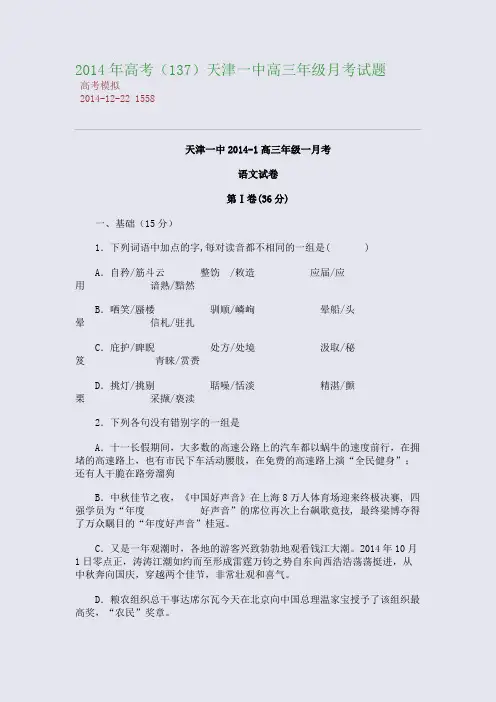
2014年高考(137)天津一中高三年级月考试题高考模拟2014-12-22 1558天津一中2014-1高三年级一月考语文试卷第Ⅰ卷(36分)一、基础(15分)1.下列词语中加点的字,每对读音都不相同的一组是( )A.自矜/筋斗云整饬 /敕造应届/应用谙熟/黯然B.哂笑/蜃楼驯顺/嶙峋晕船/头晕信札/驻扎C.庇护/睥睨处方/处境汲取/秘笈青睐/赏赉D.挑灯/挑剔聒噪/恬淡精湛/颤栗采撷/亵渎2.下列各句没有错别字的一组是A.十一长假期间,大多数的高速公路上的汽车都以蜗牛的速度前行,在拥堵的高速路上,也有市民下车活动腰肢,在免费的高速路上演“全民健身”;还有人干脆在路旁溜狗B.中秋佳节之夜,《中国好声音》在上海8万人体育场迎来终极决赛, 四强学员为“年度好声音”的席位再次上台飙歌竟技, 最终梁博夺得了万众瞩目的“年度好声音”桂冠。
C.又是一年观潮时,各地的游客兴致勃勃地观看钱江大潮。
2014年10月1日零点正,涛涛江潮如约而至形成雷霆万钧之势自东向西浩浩荡荡挺进,从中秋奔向国庆,穿越两个佳节,非常壮观和喜气。
D.粮农组织总干事达席尔瓦今天在北京向中国总理温家宝授予了该组织最高奖,“农民”奖章。
3.依次填入下列句子横线处的词语,最恰当的一项是①今天是中秋、国庆长假的第四天,长假过半,全国假日旅游市场高位运行,再迎旅游高峰。
②香槟是法国人的骄傲却带给全世界欢乐,F1方程式赛道的终点,冠军尽情香槟的泡沫来庆贺胜利.③由于习惯和欲望的,我们变得对新的真理,麻木不仁,我们发现难于否定多年来我们一直深信不疑的东西。
A.持续喷洒制约无动于衷 B.继续喷洒限制漠不关心C.继续喷撒制约漠不关心 D.持续喷撒限制无动于衷4.下列各句中,没有语病的一句是A.节假间, 部分省市普遍遭遇的用工荒,根本的原因是由工人的工资和付出不成正比,工人不愿到生活成本高的城市务工所造成的。
B.我们要加大宣传力度,教育和引导人们依法行使交通权利和义务,预防交通拥堵,减少交通延误,保障道路畅通和道路安全。

天津一中2018--2019--1高三年级一月考英语试卷本试卷分为第I卷(选择题)、和第II卷(非选择题)两部分,共150分,考试用时120分钟。
考生务必将答案涂写在答题卡和答题纸上,答在试卷上的无效。
祝各位考生考试顺利!第I卷(选择题,共115分)第一部分:听力测试(共两节,满分20分)第一节(共5小题;每小题1分,共5分)听下面5段对话。
每段对话后有一道小题,从每题所给的A、B、C三个选项中选出最佳选项。
听完每段对话后,你将有10秒钟的时间来回答有关小题和阅读下一小题。
每段对话你将听一遍。
例:What is the man going to read?A. A newspaper.B. A magazine.C. A book.答案是A。
1. When will the film start?A. At 5:00.B. At 6:00.C. At 7:00.2. Which club will the man join?A. The film club.B. The travel club.C. The sports club.3. What was the weather like in the mountains yesterday?A. Sunny.B. Windy.C. Snowy.4. What does the man want to cut out of paper?A. A fish.B. A bird.C. A monkey.5. Where does the conversation most probably take place?A. In a library.B. At a bookstore.C. In a museum.第二节(共10小题;每小题1.5分,共15分)听下面4段对话或独白。
每段对话或独白后有几道小题,从每题所给的A、B、C三个选项中选出最佳选项。
听每段对话或独白前,你将有5秒钟的时间阅读每小题。
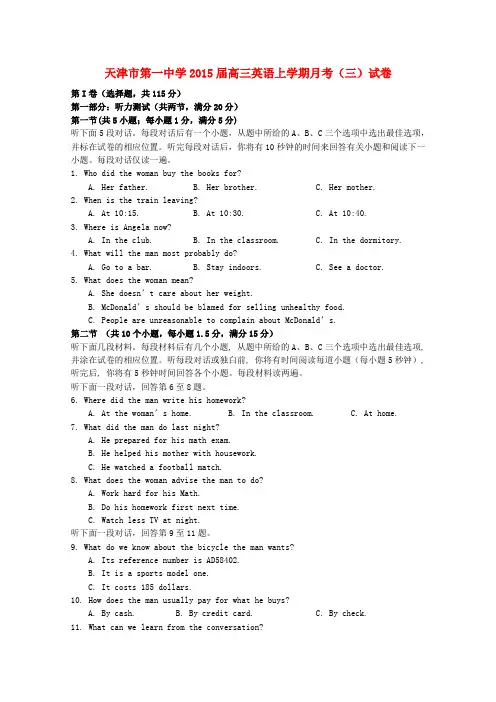
天津市第一中学2015届高三英语上学期月考(三)试卷第I卷(选择题,共115分)第一部分:听力测试(共两节,满分20分)第一节(共5小题;每小题1分,满分5分)听下面5段对话。
每段对话后有一个小题,从题中所给的A、B、C三个选项中选出最佳选项,并标在试卷的相应位置。
听完每段对话后,你将有10秒钟的时间来回答有关小题和阅读下一小题。
每段对话仅读一遍。
1. Who did the woman buy the books for?A. Her father.B. Her brother.C. Her mother.2. When is the train leaving?A. At 10:15.B. At 10:30.C. At 10:40.3. Where is Angela now?A. In the club.B. In the classroom.C. In the dormitory.4. What will the man most probably do?A. Go to a bar.B. Stay indoors.C. See a doctor.5. What does the woman mean?A. She doesn’t care about her weight.B. McDonald’s should be blamed for selling unhealthy food.C. People are unreasonable to complain about McDonald’s.第二节(共10个小题,每小题1.5分,满分15分)听下面几段材料。
每段材料后有几个小题, 从题中所给的A、B、C三个选项中选出最佳选项, 并涂在试卷的相应位置。
听每段对话或独白前, 你将有时间阅读每道小题(每小题5秒钟), 听完后, 你将有5秒钟时间回答各个小题。
每段材料读两遍。
听下面一段对话,回答第6至8题。
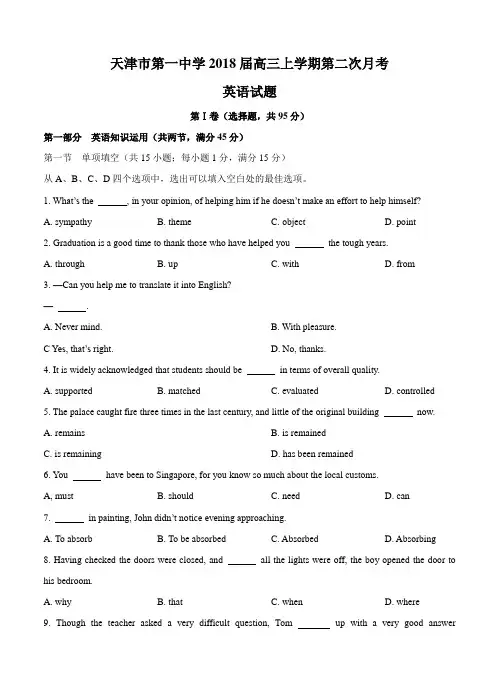
天津市第一中学2018届高三上学期第二次月考英语试题第Ⅰ卷(选择题,共95分)第一部分英语知识运用(共两节,满分45分)第一节单项填空(共15小题;每小题1分,满分15分)从A、B、C、D四个选项中,选出可以填入空白处的最佳选项。
1. What’s the , in your opinion, of helping him if he doesn’t make an effort to help himself?A. sympathyB. themeC. objectD. point2. Graduation is a good time to thank those who have helped you the tough years.A. throughB. upC. withD. from3. —Can you help me to translate it into English?—.A. Never mind.B. With pleasure.C Yes, that’s right. D. No, thanks.4. It is widely acknowledged that students should be in terms of overall quality.A. supportedB. matchedC. evaluatedD. controlled5. The palace caught fire three times in the last century, and little of the original building now.A. remainsB. is remainedC. is remainingD. has been remained6. You have been to Singapore, for you know so much about the local customs.A, must B. should C. need D. can7. in painting, John didn’t notice evening approaching.A. To absorbB. To be absorbedC. AbsorbedD. Absorbing8. Having checked the doors were closed, and all the lights were off, the boy opened the door to his bedroom.A. whyB. thatC. whenD. where9. Though the teacher asked a very difficult question, Tom up with a very good answerimmediately.A. putB. keptC. cameD. caught10. It was sad to me that they, so poor themselves, bring me foodA. mightB. wouldC. shouldD. could11. I wasn’t sure if he was really interested or if he polite.A. was just beingB. will just beC. had just beenD. would just be12. the morning train, he would not have been late for the meeting.A. Did he catchB. Should he catchC. Has he caughtD. Had he caught13. basic first-aid skills, according to the expert, will help people respond effectively to emergencies.A. KnownB. Having knownC. KnowingD. Being known14. A lot of language learning, has been discovered, is happening in the first year of life, so parents should talk much to their children during that period.A. asB. itC. whichD. this15. --Tom, your foreign teacher speaks Chinese fluently!--Oh, she has lived in China for six years; otherwise she such good Chinese.A. didn’t speakB. would not have spokenC. would not speakD. hadn’t spoken第二节完形填空(共20小题:每小题1.5分,满分30分)阅读下面短文,从16-30各题所给的A、B、C、D四个选项中,选出最佳选项。
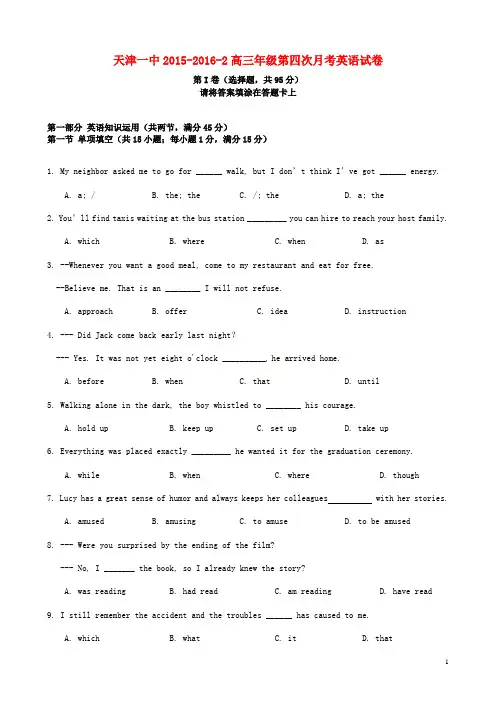
天津一中2015-2016-2高三年级第四次月考英语试卷第I卷(选择题,共95分)请将答案填涂在答题卡上第一部分英语知识运用(共两节,满分45分)第一节单项填空(共15小题;每小题1分,满分15分)1. My neighbor asked me to go for ______ walk, but I don’t think I’ve got ______ energy.A. a; /B. the; theC. /; theD. a; the2. You’ll find taxis waiting at the bus station _________ you can hire to reach your host family.A. whichB. whereC. whenD. as3. --Whenever you want a good meal, come to my restaurant and eat for free.--Believe me. That is an ________ I will not refuse.A. approachB. offerC. ideaD. instruction4. --- Did Jack come back early last night?--- Yes. It was not yet eight o'clock __________ he arrived home.A. beforeB. whenC. thatD. until5. Walking alone in the dark, the boy whistled to ________ his courage.A. hold upB. keep upC. set upD. take up6. Everything was placed exactly _________ he wanted it for the graduation ceremony.A. whileB. whenC. whereD. though7. Lucy has a great sense of humor and always keeps her colleagues with her stories.A. amusedB. amusingC. to amuseD. to be amused8. --- Were you surprised by the ending of the film?--- No, I _______ the book, so I already knew the story?A. was readingB. had readC. am readingD. have read9. I still remember the accident and the troubles ______ has caused to me.A. whichB. whatC. itD. that10. Some young people these days just ______ go out of their homes to contact the real world.A. mustn’tB. won’tC. mightn’tD. shoul dn’t11. Legend has it that the origin of the Dragon Boat Festival is to ______ the soul of Qu Yuan.A. rememberB. remindC. recoverD. recall12. —I'm dead tired. I can't walk any farther,Jenny. —______, Tommy. You can do it!A. No problemB. No hurryC. Come onD. That's OK。
2012 – 2013 – 1 天津一中高三英语零月考试卷第I卷第一部分:听力(共两节,满分20分)做题时,先将答案划在试卷上。
录音内容结束后,你将有两分钟的时间将试卷上的答案转涂到答题卡上。
第一节: (共5小题,每小题1分,满分5分)听下面5段对话。
每段对话后有一个小题,从题中所给的A、B、C三个选项中选出最佳选项,并标在试卷的相应位置。
听完每段对话后,你都有10秒钟的时间来回答有关小题和阅读下一小题。
每段对话仅读一遍。
例:How much is the shirt?A.£ 19.15.B.£ 9.15.C.£ 9.18.答案为B。
1.What does the man advise the woman to do?A.Go to bed. B.Go to the concert. C.Go to the hospital. 2.How long does it take the slow train to get to New York?A.Two hours. B.Three hours. C.Four hours.3.What will the woman probably do?A.Leave for home. B.Check the lab. C.Do her experiment.4.What do we learn about the woman?A.She is upset about the bill.B.She misunderstands the waiter.C.She complains about the food.5.What does the man imply?A.He will be playing baseball.B.He will be seeing the game.C.He will be studying.第二节:(共10小题;每小题1.5分,满分15分)听下面几段材料。
第一部分:语言知识运用(共两节,满分45分)第一节:单项选择(共15小题;每小题1分,满分15分)1. Mr Smith, _____ director of the company, can‘t afford _____ week to travel abroad.A. a; aB. the; theC. /; theD. /; a2. The expert did encourage the ______ of new medical treatments into his own country.A. attentionB. introductionC. intentionD. information3.----Silly me! I forget what my luggage looks like.----What do you think_______over thereA. itB. thatC. thisD. the one4. Remember to bring the _______ money to the primary school in the village.A. collectingB. collectedC. being collectedD. being collecting5. You can predict everything. Often things don't_______ as you expect.A. run outB. break outC. work outD. put out6. He told me that his request for a rise had been _____.A. turned outB. turned overC. turned aroundD. turned down7. The speaker _____ pronunciation is the best will get the first place.A. whoseB. whichC. whatD. that8. The little girl is seriously ill. Luckily we have decided to do ______ it takes to help.A. whicheverB. whateverC. wheneverD. however9. ----Will Barbara come to our party?----I am not sure, because he ____ go to the concert with his friend.A. canB. mustC. shouldD. might10. ______ in the hometown, he went back to company.A. Having visitedB. Not having visitedC. VisitingD. Not visiting11. ----It is nice. Never before___________ such a special drink!---- I am glad you like it.A. I have hadB. I had hadC. have I hadD. had I had12. It is still a problem ______ to hide the stolen money.A. whyB. whichC. whereD. who13. ----I really don‘t know when we can get over all the troubles.---- ______! Our troubles will soon be over.A. Forget itB. Cheer upC. Neither do ID. What a pity14. Nowadays it is obvious that the Internet _______ our life rapidly.A. would changeB. changedC. had changedD. is changing15. ----Do you think Tim did well in the English speech contest?----______. He won the first place.A. He could n‘t have done better.B. He played naturallyC. He was not nervous at allD. I couldn‘t agree more第二节完形填空(每小题1.5分,满分30分)Doing community service work, I spent three or four hours handing out warm dinner to the homeless out in the streets. After that I went to a 16 shelter not far from the Bay Bridge.I was in high school and at the time my sis ter was too young to 17 . She wanted to help,18 she made four or five dozen chocolate chip cookies for me to 19 and hand out to people. When getting to the homeless shelter I passed out the remaining meals. I had the containers with my 20 cookies in them and began to 21 , offering them to anyone near me.I 22 an old gentleman and said, ―Sir,would you like a cookie?‖ He stopped and turned around, looked at me 23 in the eye and said, ―What did you say? Did you call me sir?‖ I told him I had, and his eyes 24 a little bit and he said, ―No one has25 called me sir.‖ He was completely taken aback.It struck me.I explained I had been raised that 26 color and social status, everyone deserved 27 . It made me 28 to think that just because he was homeless, no one 29 him the honor. It broke my 30 , and I couldn‘t help 31 cry. I just didn‘t understand32 no one ever called him sir? I had never thought that anyone was below me because I wasn‘t raised that way. Every 33 person deserves to be treated with dignity. Years later, I still carry that memory and the 34 it taught me. Sometimes, what we take for granted can 35 make a difference in someone‘s life.How have you made a difference to others? How have others made a difference to you?16. A. useless B. careless C. homeless D. hopeless17. A. participate B. involve C. choose D. go18. A. however B. but C. yet D. so19. A. bring B. fetch C. collect D. take20. A. classmate‘s B. schoolmate‘s C. sister‘s D. family‘s21. A. walk around B. knock around C. come around D. stand around22. A. went B. came C. approached D. met23. A. right B. even C. still D. just24. A. watered B. cried C. tore D. dropped25. A. already B. ever C. still D. yet26. A. in spite B. regardless of C. concerned about D. for fear of27. A. happiness B. truth C. respect D. help28. A. strong-minded B. sad C. frightened D. pleased29. A. handed B. afforded C. provided D. supplied30. A. eyes B. mind C. opinions D. heart31. A. but B. and C. until D. or32. A. what B. when C. whether D. why33. A. single B. poor C. ordinary D. normal34. A. stories B. lessons C. experiences D. tears35. A. equally B. hardly C. really D. finally第二部分:阅读理解(共20小题;每小题2分,满分40分)阅读下列短文,从每题所给的四个选项A、B、C和D中,选出最佳选项,并在答题卡上将该项涂黑。
天津一中2011-2012高三年级一月考英语试卷第I卷第一部分:听力(共两节,满分20分)做题时,先将答案划在试卷上。
录音内容结束后,你将有两分钟的时间将试卷上的答案转涂到答题卡上。
第一节: (共5小题,每小题1分,满分5分)听下面5段对话。
每段对话后有一个小题,从题中所给的A、B、C三个选项中选出最佳选项,并标在试卷的相应位置。
听完每段对话后,你都有10秒钟的时间来回答有关小题和阅读下一小题。
每段对话仅读一遍。
1. How many people live in the woman’s dorm?A. TwoB. ThreeC. Four2. What do we learn from the conversation?A. The woman has been working too hard.B. The woman is tired of her work.C. The woman is seeing a doctor.3. What do we know about the chair?A. It is damaged.B. It is blue and yellow.C. The salesman is charging 159 dollars for it.4. What are the speakers going to do?A. Learn some ChineseB. Print the menu in English.C. Have dinner.5. Where do the speakers plan to go?A. A shopping center.B. An opera house.C. The parking lot.第二节: (共10小题;每小题1.5分,满分15分)听下面几段材料,每段材料后有几个小题,从题中所给的A、B、C三个选项中选出最佳选项,并标在试卷的相应位置。
天津一中2013-2014-1 高二年级期中考试英语学科试卷本试卷分为第I卷(选择题)、第II卷(非选择题)两部分,共100分,考试用时90分钟。
请将答案涂写在答题卡和答题纸上,答在试卷上的无效。
祝大家考试顺利!第I卷I. 听力(共20小题,每题0.5分,满分10分)第一节听下面5段对话。
每段对话后有一个小题,从题中所给的A、B、C三个选项中选出最佳选项,并标在试卷的相应位置。
听完每段对话后,你都有10秒钟的时间来回答有关小题和阅读下一小题。
每段对话仅读一遍。
1. Where does the conversation probably take place?A. In a dorm.B. In a restaurant.C. In a classroom.2. What is the woman’s trouble?A. She is late for the class.B. She can’t find the classroom.C. She has little chance of getting into that class.3. What probably is the woman?A. An operator.B. A waiter.C. A bank clerk.4. What is the woman’s concern?A. The boy is lazy.B. Her family may get sick.C. She can’t wash the dishes clean.5. How did the man travel?A. By ship.B. By car.C. By air.第二节听下面5段对话或独白。
每段对话或独白后有几个小题,从题中所给三个选项中选出最佳选项,并标在试卷的相应位置。
听每段对话或独白前,你都有时间阅读各个小题,每小题5秒钟;听完后,各小题将给出5秒钟的作答时间。
课 题主 备 人李慧珍备课时间第二周第 4 课时备课组长签名教研组长签名教学内容Unit 1 section B 1a, 1b ,1c, 2a, 2b, 2c个性化备课教 学 目 标知识技能learn some new words and phreses: zero ,one two ,three ,four, five, six, seven ,eight, nine telehpone ,number, it , telephone number learn some key sentences: ---What’s your telephone number? ----It’s… learn how to listen and say numbers 过程与方法Direct method Communicative Approach情感态度价值观Can understand and say the telephone numbers,and Conscultive the students ’ English consciousness.教学重点Master the new words ,phrases and sentences ,and can use them in our daily life 教学难点The expression of phone numbers.教 学 过 程 Period 4 Step 1.lead in Enjoy the song “ Ten Little Indian Boys”. This can make students intersted in the lesson show some pictures of numbers on the screen . Step 2: Show the teaching aims: 1. learn and master some new words and phreses: zero ,one two ,three ,four, five, six, seven ,eight, nine telehpone ,number, it , telephone number 2.learn and master some key sentences: ---What’s your telephone number? ----It’s… 3.learn how to listen and say numbers Step 3. Individual learning and selfcheck Task 1. read 1a and 1b by yourselves and find out the new words Task 2. How to read out the telephone number Selfcheck: translate the new words and read them out zero one two three four five six seven eight nine telehpone number telephone number it 完成优化设计unit 1 period3 预习导航 任务一 任务二 Step 4. Discussion and questions listening practice . finish 1b pairwork T: What’s your telephone number? S:It’s … listening practice finish 2a and 2b Step 5 . summarize the whole class Step 6: A quiz in class 1. Grouwork 2c. ask four classmates for their phone numbers and fill in the addree book 2.完成优化设计unit 1 period3 优化训练 I , II, III, IV 教 学 反 思 初中学习网,资料共分享!我们负责传递知识!。
2013-2014学年第一学期高三第二次六校联考英语试卷本试卷分第I卷(选择题)、第II卷(非选择题)两部分,共150分,考试用时120分钟。
第I 卷1至10 页,第II卷11 至12 页。
考试结束后,将答题卡收回。
祝各位考生考试顺利!第I卷选择题(共115分)注意事项:1.答第I卷前,考生务必将自己的姓名、准考证号、考试科目用2B铅笔涂写在答题卡上。
2.选出答案后,用铅笔把答题卡上对应的题目的答案标号涂黑,如需改动,用橡皮擦干净后,再填涂其它答案,不能答在试卷上。
3.本卷共70小题,满分115分。
第一部分:听力(共两节,满分20分)第一节(共5小题;每小题1分,满分5分)听下面5段对话。
每段对话后有一个小题,从题中所给的A, B,C三个选项中选出最佳选项,并标在试卷的相应位置。
听完每段对话后,你有10秒钟的时间来回答有关小题和阅读下一小题。
每段对话仅读一遍。
1. When does the store close in the evening?A. At 11:00.B. At 11:30.C. At 12:00.2. What will the woman probably do?A. Water the plants.B. Wash the car.C. Do nothing.3. Where did the woman meet Tom?A. Outside the bank.B. In the bank.C. In the post office.4. What do we know about James?A. He is never late.B. He is often late.C. He is not patient.5. What will the woman do?A. To sit down before going in.B. To go into the store with the man.C. To buy the shoes before going in.第二节(共10小题;每题1.5分,满分15分)听下面3段材料。
天津一中2013-2014-1高三年级二月考英语试卷第I卷(选择题,共115分)第一部分:听力(共两节,满分20分)第一节(共5小题,每小题1分,满分5分)听下面5段对话,每段对话后有一个小题,从题中所给的A、B、C三个选项中选出最佳选项,并标在试卷的相应位置,听完每段对话后,你将有10秒钟时间来回答有关小题和阅读下一小题。
每段对话仅读一遍。
例:How much is the shirt?A. £19.15.B. £9.15.C. £9.18.1. What are the students asked to do before Tuesday?A. Do some reading.B. Listen to some radio programs.C. Talk about the Olympic Games.2. Where does this conversation probably take place?A. At the graduation ceremony.B. At home.C. In a competition.3. Why does the guest complain about the food?A. It isn‟t what he ordered.B. The fish is smelly.C. The food doesn‟t taste good.4. What does the man seem to worry about most?A. Whether the children will like it.B. The number of bedrooms.C. The price to fit their budget.5. What does the man mean?A. He won‟t be able to help the woman.B. The library is closed tonight.C. Jean is using his car.第二节(共10小题,每小题1.5分,满分15分)听下面3段对话或独白。
每段对话或独白后有几个小题,从题中所给的A、B、C三个选项中选出最佳选项,并标在试卷的相应位置。
听每段对话或独白前,你将有时间阅读各个小题,每小题5秒钟;听完后,各小题将给出5秒钟的作答时间。
每段材料读两遍。
听第6段材料,回答第6 至8题。
6. Why does the woman choose the restaurant?A. The restaurant is the nearest.B. The food tastes good and the price is reasonable.C. She decides everything because she knows best.7. What does the man need first?A. A Chinese diet.B. Some orange.C. A glass of mineral water.8. Why doesn‟t the man like what the woman ordered?A. The price is too high.B. They will have to wait for a long time.C. It is not healthful听第7段材料,回答第9至11题。
9. Where will the woman stay in Paris?A. She has booked a hotelB. She will live with the man.C. She will stay at her cousin‟s.10. When will the woman leave for her holiday?A. At 9:15 a.m. on Wednesday.B. Wednesday evening.C. On Friday.11. How soon will the speakers see each other?A. Not definitely decided.B. On Friday.C. In a week.听第8段材料,回答第12至15题。
12. What is the aim of the research in the United States?A. To prevent people from going to public toilets.B. To observe how people behave in the public places.C. To see how the good advice to wash hands is followed.13. What does the study show?A. People don‟t seem to wash their hands as often as they say.B. Most people are not afraid of getting sick.C. Not many people use public toilets.14. How many people in the U.S.A. were observed in the program?A. 1,000.B. 8,000.C. 9,000.15. What is the percentage of people who lied about washing hands according to the study?A. 95%B. 67%C. 28%第二部分:词汇知识运用(共两节,满分45分)第一节:单项选择(共15小题;每小题1分,满分15分)16. —I‟ve got something weighing on my mind. Could you give me some advice?—. Tell me all about it and I'll do what I can.A. Don‟t mention itB. No wonderC. No problemD. Forget it17. It is reported that the employment situation in east China __________ in the last two months,with a rebound in monthly figures.A. has improvedB. improvedC. was improvedD. was improving18. Tianjin, __________ among the 10 cities with the worst air quality in the third quarter of the year,has shut down 440 high polluting factories since January this year.A. listedB. listingC. being listedD. to list19. The number of newly-added jobs increased rapidly in underdeveloped west China, while that of central China remained _______ in the first six months.A. peacefulB. unmovedC. stableD. smooth20. Manchester United has decided that Wayne Rooney will not be sold to Chelsea no matter how much money is offered or ___________ the potential risks of keeping an unhappy player.A. howeverB. whateverC. whatD. whether21. What I am about to say is that nobody can ______ this amount of work in such a short time.A. get throughB. get offC. get intoD. get down.22. The newly-founded company is faced with lots of challenges, _________ the financial problemis the worst.A. whichB. of whichC. without whichD. with which23. Jackson refused to accept the reward b ecause he thought he didn‟t _______the honor.A. holdB. obtainC. deserveD. achieve24. The more active you are, the more likely you'll be ____ new friends.A. madeB. to makeC. to have madeD. making25. Being more realistic, the elderly have learned to focus on things that make them happy and let goof ____ that don‟t.A. themB. itC. thatD. those26. To help more people find jobs, more _______ will be made to provide training for workers, as demand for skilled labor remains high in some areas.A. effortsB. effectsC. efficiencyD. affects27. All citizens who have reached the age of 18 have the right to vote, ___________ race, sex, occupation, family background, religious belief, or education.A. againstB. regardless ofC. in spite ofD. even though28. —I failed in the driving test again .Sorry to let you down.—_________? I‟ve helped you practice enough.A. So whatB. Why notC. Who knowsD. How come29. — Was it 11 o'clock your father came back last night?—Yes, he is always coming back so late.A. thatB. whileC. whenD. until30. A survey has found that many medical workers would not choose the profession __________ a second chance, citing high stress and tense patient-doctor relationships.A. they were givenB. they will giveC. they should giveD. should they be given第二节:完形填空(共20小题;每小题1.5分,满分30分)阅读下面短文,从短文后所给各题的四个选项(A、B、C和D)中,选出可以填入空白处的最佳选项,并在答题卡上将该项涂黑。